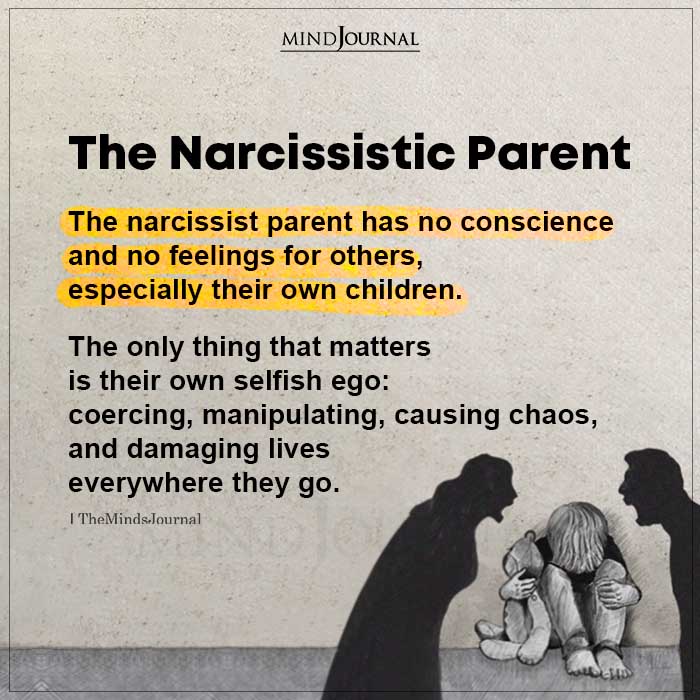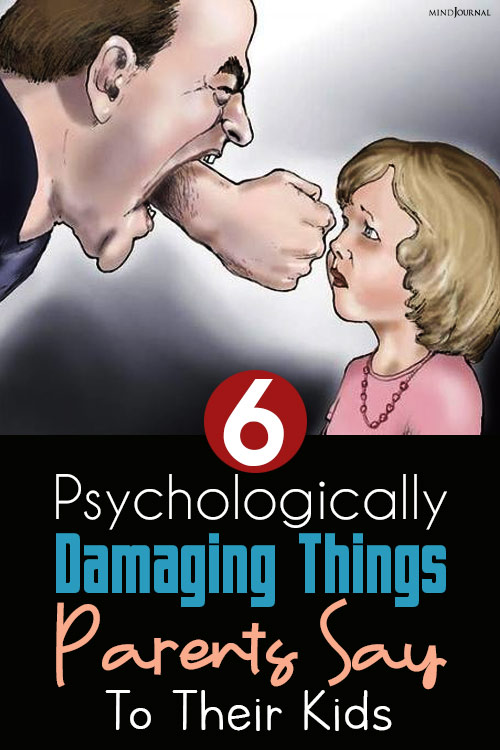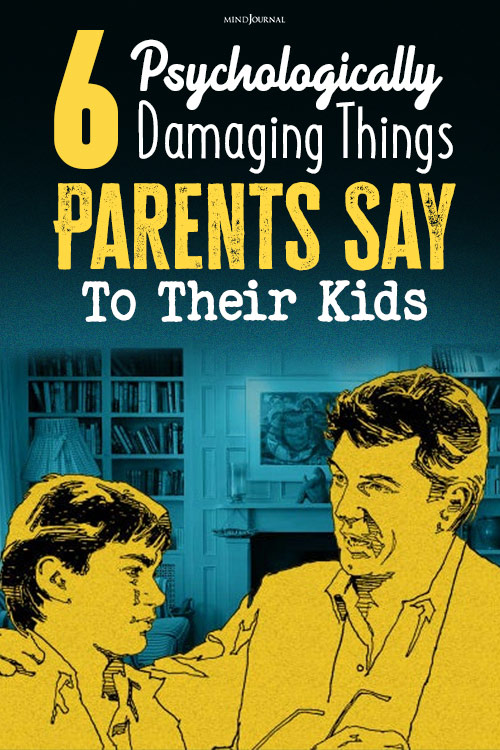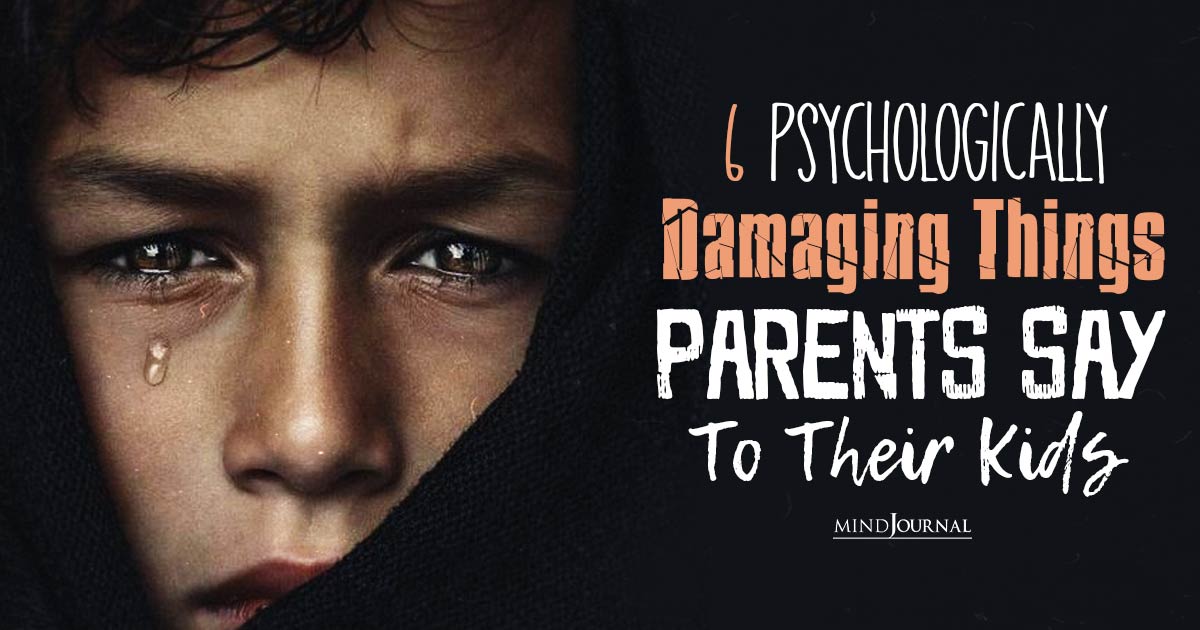The psychologically damaging things parents say to their kids can cause long-reaching damage that extends to their adulthood.
Kids have fragile brains. If 10-year-old Jimmy bashes his head against concrete, he’ll suffer greater injury than his 35-year-old dad would under the same conditions.
Most of us instinctively know that much. What we often ignore, though, is the fact that kids’ brains are not only physically more fragile but psychologically as well. Psychologists liken a child’s brain to soft, impressionable Play-Doh.
When parents say hurtful things, a child cannot shrug them off and their formative mind suffers a huge blow.
Some of the psychologically damaging things parents say may seem harmless but they have the power to affect a child’s psychological development that will go far into his adult life.
Let’s find out what are the most mentally damaging things parents say to kids.
Related: The Unseen Scars of Parental Emotional Abuse
6 Psychologically Damaging Things Parents Say To Their Kids
1. “You’re too sensitive”
According to psychologists, many kids are simply born with a more finely tuned nervous system. As a result, they react quickly and intensely to just about everything. Parents of such kids often make the mistake of trying to wash that sensitivity out.
Over time, this throws the child’s brain chemistry out of wack and reduces their ability to empathize with others. After all, if they’re taught that their emotions don’t matter, why would they think anyone else’s does?
Child psychologists encourage parents to listen to and accept a child’s emotions, even if they don’t seem logical.

2. “That’s life”
When your child comes home upset because their crush rejected their dance request, it can be tempting to say, “Well, that’s life.” But remember though you may not think so, it is one of the most hurtful things parents say unwittingly. What that phrase suggests is, “Hey – your experience here is nothing unique, so suck it up.”
That might be totally appropriate to say to a 25-year-old under the same circumstances. But a child’s brain is physically unable to grasp the fact that their experiences are not unique. When you tell them that, they’ll feel guilty, frustrated, and confused.
Instead, you should validate their experience and then encourage resiliency.
Related: Effects of Growing Up as an Unloved Child and How To Heal
3. “Because I said so”
I get it. Little Jimmy refuses to go to sleep at 8 pm unless he knows why. His mom, exasperated goes, “You wanna know why? Because I said so.” This is another one of the bad things parents say to kids that impair their emotional development.
That is a terrible response. It tends to build resentment in children because it forces them to accept a dogmatic belief. This will inevitably lead to a power struggle when that child learns to come up with answers on their own that question their parents’ authority.
Instead, as frustrating as it might be, why not just answer the question? I mean, your parenting decisions are based on logic – why not share that with your child? It will help them understand that, sometimes, authority really does know best.
4. “Shut up”
Kids learn from a very young age that the phrase ‘shut up’ is meant as an insult. And let’s face it – the last person who should be insulting a child is their parent. Now, chances are you’ve got a very good reason for telling your child to ‘shut up.’
That reason is likely that you’re overwhelmed. It happens. Your kid won’t stop singing Justin Bieber and it’s really frustrating. Nonetheless, it is one of the psychologically damaging things parents say that affects the child’s self-esteem.
Instead of telling them to shut up, why not explain that – “Hey, mommy had a long day and she’d really appreciate some quiet?” Better still, give your child a chance to make all the noise they want and tell them that at ‘X’ time, they need to be quiet.
Related: 5 Ways Childhood Emotional Neglect Causes Depression in Adulthood
5. “You never” Or “You always” statements
Although children have behavioral patterns, telling them they “always do this” or “can never do that” not only diminishes their potential but also fails the parent to study the kid’s specific reactions in a given situation.
These are some psychologically damaging things parents say to channel their frustrations, which do no good to their kids’ development.

6. “You should know better”
This is one of the mean things parents say to kids that seem completely harmless on the surface.
But when you say this to your kid, it sends the wrong message that they are not smart enough, that they really supposed to know something and it’s their fault that they don’t know what it is.
Instead, let your child participate in the process of finding a solution. “Let’s figure out this one” can be a loving and positive thing you can say to a child.
Related: Covert Verbal Abuse: Is Someone Telling You How You Should Feel?
Patience Is The Key
It’s quite clear that being patient and taking time before responding to your kid can be a game-changer. Some of the most damaging things parents say to their kids are not meant to cause the child any trauma, however, the things parents say to kids casually or out of frustration can be severely traumatizing for them.
What is the most psychologically damaging thing you can say to a child? That you don’t love or accept them as they are!
These were some of the most common examples of things parents say to their children that end up having a long-term effect on their mental health. Were you told any of these hurtful things as a child? Or are you in the habit of saying these things to your kid? Let us know in the comments down below!
Frequently Asked Questions
Why do parents say mean things to their children?
Parents often say hurtful things when they feel overwhelmed or exasperated. Some parents also say mean things because they are negligent of their kids’ emotional health.
What’s the worst thing a parent can say to their kid?
The worst thing a parent can say to their kid is that they don’t love or accept them as they are.
What are the things toxic parents say?
Toxic parents can say a number of things that negatively affect their child’s psychology, such as “I wish you were never born”, “I wish you were different.”, “I wish I had an abortion”, etc.















Leave a Reply